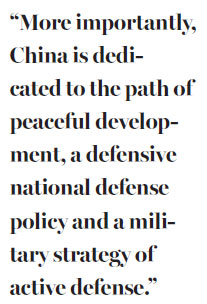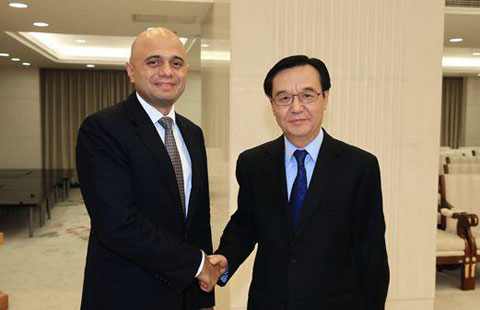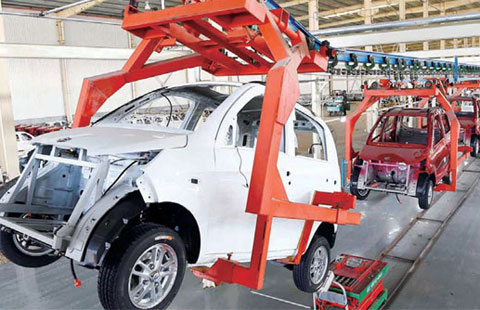Military spending in pace with peaceful development
Updated: 2016-03-11 08:08
By Lu Yin(China Daily Europe)
|
|||||||||
Budget guarantees advancement in capabilities and adheres to policy that has always been defensive in nature
China's military budget will rise 7 to 8 percent this year, it was announced on March 4. The increase has drawn worldwide attention, as usual, although it will be less than in previous years.
Foreign critics have been most concerned in recent years about the modernization of China's military, which is basically guaranteed by the increase in the defense budget. But what critics don't understand is that China's growing military capacity will not pose a threat to regional peace and security.
First, the increase in the defense budget is justified, especially as the military's modernization has always been at an appropriate level.
China needs its armed forces to protect its peaceful development. This is important for maintaining peace and managing crises. China has to safeguard its sovereignty, security and development interests, and to deal with both traditional and nontraditional security threats. Given these facts, China has every reason to develop its military's capabilities.
Militaries of all countries need to develop, for that is the global trend, and the Chinese military is no exception. As China's military is in the semimechanized/mechanized stage of development, it still lags behind others in terms of capacity. And it will take a long time to become a fully modernized force. The military's development is in proportion to China's economic development, with the latter being the national priority.
Second, to determine whether a country's military poses a threat to other countries, the key factor is not defense expenditure or the size and capability of its armed forces; instead, it is its defense policy and military strategy. A country with an aggressive policy could invade another country despite having a weaker military.
Another typical misconception about China's military is that, since its missiles can strike a certain country, it is capable of destroying that country's satellites and thus poses a threat. But the fact is that many countries have developed long-range strategic missiles. The United States has the greatest capability of destroying other countries' space assets, and its weapon systems can attack any country. So is the US the greatest threat to the world?

Also, let us not forget that the US has 11 aircraft carriers, while China has just one, which is not fully operational. It is therefore clear that it is a country's defense policy that matters most in determining whether it poses a threat to other countries. China's national defense policy has always been defensive in nature, and its military strategy is to strike only when it is struck.
Third, as China has developed at an unprecedented pace because of a peaceful environment, it is committed to maintaining peace. The nation plans to double the average income of its people by 2020 compared with 2010 and become a mid-level developed country by 2050. All this can be achieved only in a peaceful environment - a conflict or war will disrupt the process.
Today, we live in a world of shared destinies and interdependence. In the 21st century, no country, including China, can rise by using military force. More importantly, China is dedicated to the path of peaceful development, a defensive national defense policy and a military strategy of active defense.
China at one time was bullied, invaded and partially colonized. As a result, it will never pursue expansionism or hegemonism.
And fourth, with a reasonable increase in its budget, the Chinese military will develop steadily to fulfill its domestic and international obligations and responsibilities. In addition, the military will continue to participate in United Nations peacekeeping missions and conduct escort and anti-piracy missions in the Gulf of Aden, and other seas, as required, and work with other countries to maintain world peace.
The Chinese military is also committed to reducing risks, managing crises and controlling conflicts, so as to prevent untoward incidents from disrupting peace and stability.
With the growth in China's national strength, its military will be better prepared to shoulder more international responsibilities, provide more public-security services to the international community, and contribute more to world peace and common development.
The author is an associate researcher with the Institute of Strategic Studies at the People's Liberation Army National Defense University. The views do not necessarily reflect those of China Daily.
(China Daily European Weekly 03/11/2016 page10)
Today's Top News
Experts confident in growth objective
Clinton, Sanders spar over immigration
Scholar praises pragmatic government work report
China hits back at US over ZTE restrictions
Longer visas for foreign experts eyed to ease entry
China scholar praises pragmatic govt work report
Female condom made in China wins WHO approval
China hits back at US over restrictions on ZTE
Hot Topics
Lunar probe , China growth forecasts, Emission rules get tougher, China seen through 'colored lens', International board,
Editor's Picks

|

|

|

|

|

|






